|
|
|
Sort Order |
|
|
|
Items / Page
|
|
|
|
|
|
|
| Srl | Item |
| 1 |
ID:
139037
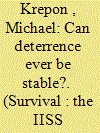

|
|
|
|
|
| Summary/Abstract |
Stability has been the holy grail of deterrence strategists since the outset of the US–Soviet nuclear-arms competition. This prize has been elusive because nuclear weapons are not stabilising. The bomb has had limited, but important, utility in preventing large-scale conventional war, and by fostering cautious behaviour in severe crises.
|
|
|
|
|
|
|
|
|
|
|
|
|
|
|
|
| 2 |
ID:
139036


|
|
|
|
|
| Summary/Abstract |
Since the end of the Cold War, the United States has pursued a two-pronged strategy towards China. On the one hand, Washington has sought to engage Beijing across a wide range of domains, including through bilateral diplomacy, participation in multilateral institutions, trade, investment, scientific cooperation, educational and cultural exchange, civil-society initiatives and military-to-military dialogues. While activity in most of these areas extends back to the initial Nixon–Kissinger ‘opening’ to China in the late 1960s, since the early 1990s there has been a substantial broadening and deepening in each.
|
|
|
|
|
|
|
|
|
|
|
|
|
|
|
|
| 3 |
ID:
139038
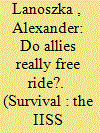

|
|
|
|
|
| Summary/Abstract |
American decision-makers and security analysts often complain that allies ‘free ride’ on the United States. In 2011, then-secretary of defense Robert Gates spoke of how ‘nations [are] apparently willing and eager for American taxpayers to assume the growing security burden left by reductions in European defense budgets’, and warned of NATO’s ‘dismal future’ if European allies did not contribute their fair share.
|
|
|
|
|
|
|
|
|
|
|
|
|
|
|
|
| 4 |
ID:
139039
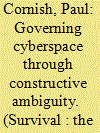

|
|
|
|
|
| Summary/Abstract |
At its simplest, cyberspace is a global medium for communication and information exchange between computers and their human operators, an environment (of sorts) in which it is possible for digital signals to be sent, received and processed. Like other communications media, the operating
conceit of cyberspace is that it should be indifferent to the quality and meaning of the traffic it carries. It comes as no surprise, then, that cyberspace can be a vehicle for challenge, insecurity, instability, crime and competition. But it can just as often signify opportunity: commercial, economic, cultural, political, social and even moral, in terms of individual human fulfilment.
|
|
|
|
|
|
|
|
|
|
|
|
|
|
|
|
| 5 |
ID:
139033
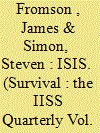

|
|
|
|
|
| Summary/Abstract |
The American-led coalition has reached a turning point in the battle against the Islamic State of Iraq and al-Sham (ISIS). Where previously the campaign was framed in defensive terms – the need to protect Iraqi minorities and prevent the fall of Baghdad and Erbil – the emerging narrative in Washington now centres on a well-advertised ground offensive to retake the ISIS stronghold of Mosul and, implicitly, to break the organisation’s back. The time is ripe for strategic reassessment – or, perhaps more accurately, an open-source assessment that did not occur during the first rush to action in summer 2014.
|
|
|
|
|
|
|
|
|
|
|
|
|
|
|
|
| 6 |
ID:
139035
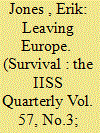

|
|
|
|
|
| Summary/Abstract |
Two of the great risks facing the European economy are the exit of Greece from the single currency and the exit – or distancing – of the United Kingdom from the European Union (EU) It is easy to think of these threats as similar, even if only because they have similarly catchy names (‘Grexit’ and ‘Brexit’) for use in popular debate. But King’s College London professor Anand Menon reminded me recently that they are actually very different. His point was that British exit from the EU would be a long, difficult and conflictual process. My argument here is that any Greek exit from the euro would centre on a short, punctuated event.
|
|
|
|
|
|
|
|
|
|
|
|
|
|
|
|
| 7 |
ID:
139034


|
|
|
|
|
| Summary/Abstract |
The protection of women, children and religious minorities was among the most prominent reasons US President Barack Obama offered for taking military action against the Islamic State of Iraq and al-Sham (ISIS): ‘They kill children. They enslave, rape and force women into marriage. They threatened a religious minority with genocide.’ Obama attributed singular malevolence to ISIS, claiming that ‘in a region that has known so much bloodshed, these terrorists are unique in their brutality’.
|
|
|
|
|
|
|
|
|
|
|
|
|
|
|
|
|
|
|
|
|